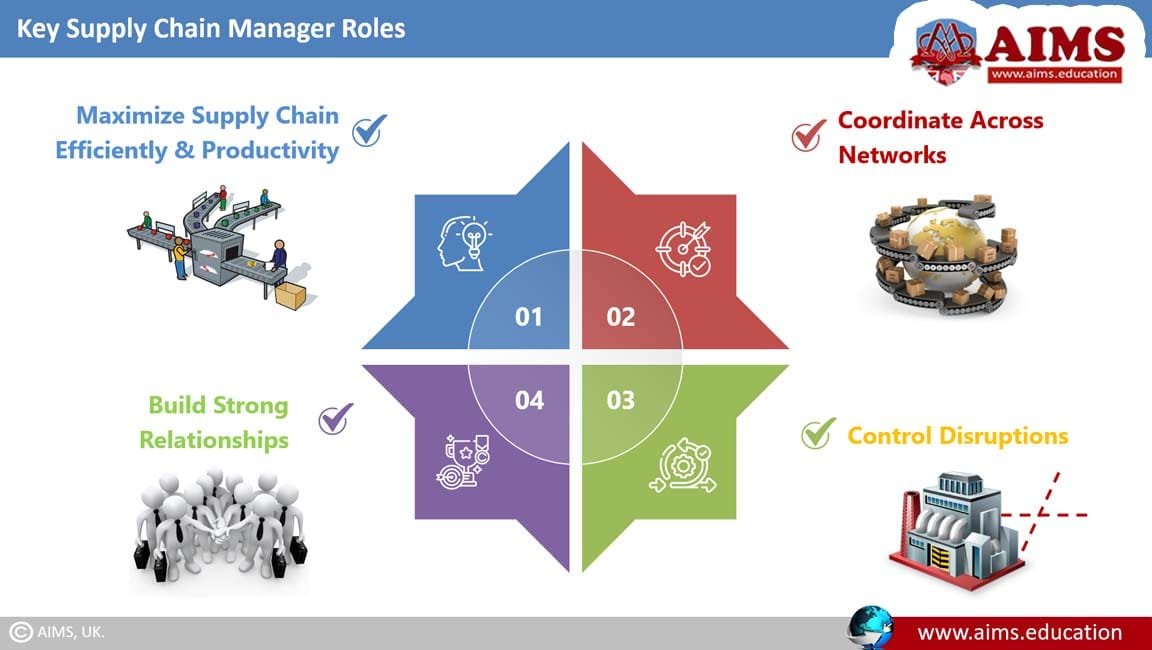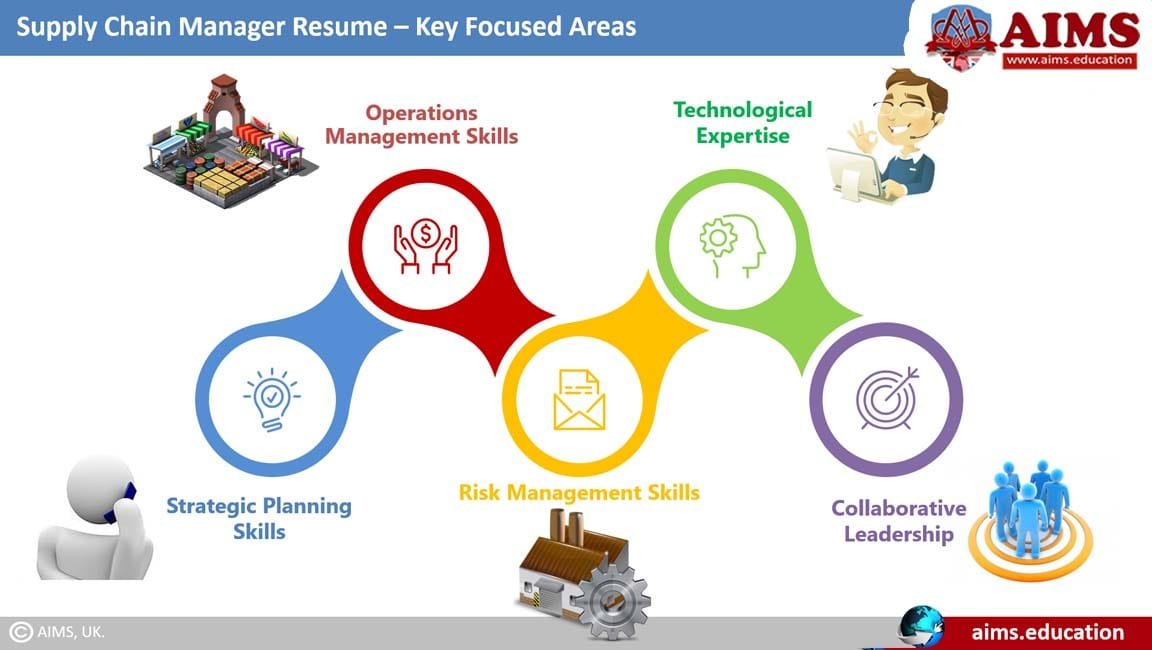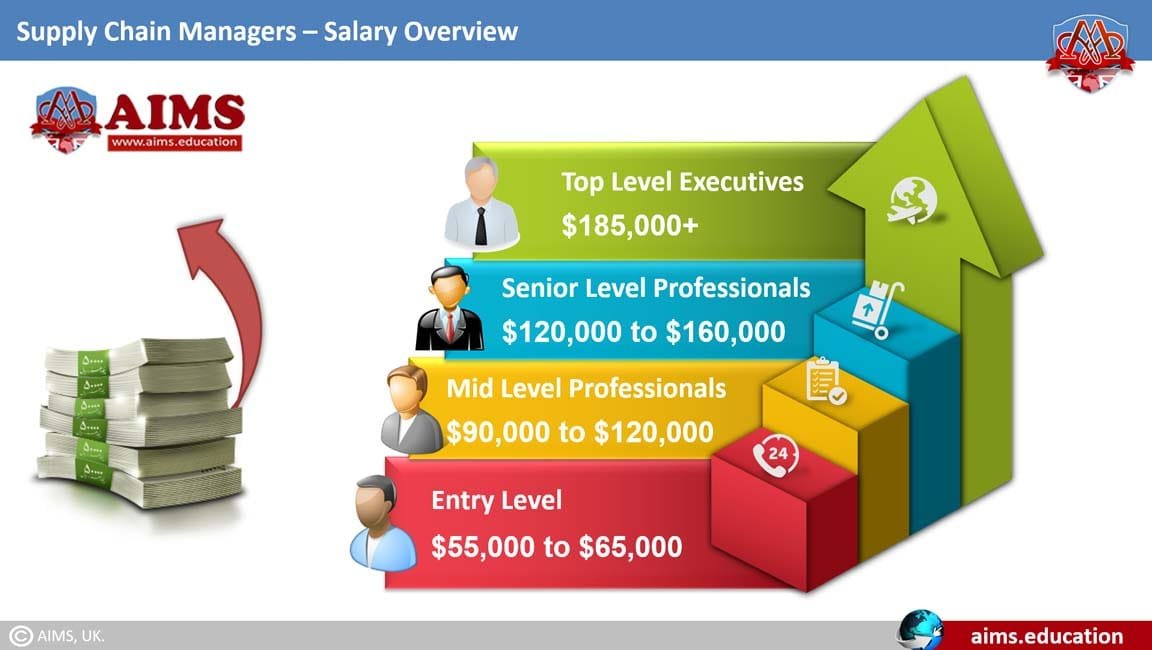What is Supply Chain Manager?
A Supply Chain Manager supervises all supply chain activities including procurement, logistics, and warehousing. Supply Chain Manager job description includes developing and implementing strategies that can improve efficiency, minimize costs, and mitigate risks in supply chains. Additionally, supply chain manager collaborate with different departments and stakeholders in order to align supply chain goals with the organization’s overall business objectives.
- Through continuous innovation and operational excellence, supply chain managers enhance organization’s cost-effectiveness and competitive advantage.
- The supply chain management field encompasses many dynamic components that make supply chain manager jobs highly rewarding.
As a senior hiring professional, I can ensure that if you possess the right supply chain management education, skills and expertise, your demand in supply chain management industry is high. You can easily find an excellent supply chain manager job in top-tier organization that align with your career goals and interests.

Supply Chain Manager Job Description
The key roles and responsibilities of supply chain managers are explained below:
1. Maximiz Efficiency and Productivity
Supply chain managers are responsible to ensure maximum productivity and efficiency across their supply chain, and streamline logistics processes accordingly.
For Example:
A supply chain manager in an e-Commerce company optimized warehouse operations by implementing automated picking systems. As a result, order fulfillment time reduced by 23%.
2. Build Strong Relationships
Supply chain manager job description also includes establishing strong relationships with vendors, suppliers, and key distributors to achieve their business goals.
For Example:
Recently, at a car manufacturing company in Japan, supply chain managers developed long-term partnerships with suppliers. This supplier relationship management ensured 30% reduction in lead time and maintained a steady flow of parts during the global semiconductor shortage.
3. Coordinate Across Networks
Supply chain managers must also maintain effective coordination with senior management to develop strategies for supply chain operations. They are required to collaborate with other departments and ensure that all supply chain management processes are streamlined.
For Example:
A senior supply chain manager at leading USA Mobile Phone manufacturer collaborated with design and procurement teams in China to secure components for a new Phone launch. It helped the company meet production targets of over 83 million units in a single year.
4. Respond to Bottlenecks
The supply chain manager job description primarily includes addressing supply chain bottlenecks and taking necessary actions to control disruptions promptly. To achieve maximum output, companies should ensure that their supply chain managers are well-trained to guide and lead their teams effectively. This approach helps maintain efficiency across supply chains, and as a result, continuous process improvements can be achieved.
For Example:
During the COVID-19 pandemic, supply chain managers of a giant stored in America rerouted shipments and secured alternative suppliers. This action reduced potential stock shortages by 38% and ensured consistent inventory for high-demand items.

How to Write a Supply Chain Manager Resume?
With over 25 years of hiring experience, I am confident that if the following supply chain skills and personal qualities are effectively highlighted on your supply chain manager resume, there is a 90% chance of being shortlisted for the interview stage.
Below, I will break down each skill and attribute in detail:
1. Strategic Supply Chain Planning
Align your skills with the supply chain manager job description and mention your ability to manage supply chains. In the supply chain manager resume, explain that how you developed and executed strategic plans that aligned with the organization’s goals and long-term objectives.
2. Supply Chain Operational Efficiency
You should ensure efficient management of daily supply chain operations, including inventory control, logistics, and procurement management activities.
3. Supply Chain Risk Management
If you have supply chain risk management skills, you must highlight your past experience in this area on your supply chain manager resume. Provide specific examples from your past supply chain manager job description, where you identified potential risks and developed contingency plans that ensured uninterrupted supply chain operations.
4. Supply Chain Technological Expertise
The supply chain manager job description nowadays involves greater use of technology and digital tools than ever before. If you have the ability to leverage supply chain automation solution and using supply chain analytical tools, you must highlight how you have improved supply chain performance, enhanced transparency, and enabled data-driven decision-making in your previous supply chain manager roles.
5. Collaborative Leadership
It is essential in a supply chain manager resume to mention strong leadership and communication skills. If you have past experience coordinating with stakeholders and cross-functional teams, ensure that you include this experience on your resume, highlighting how your effective supply chain collaboration contributed to your past employers’ achievements and overall success.
5 Categories of Supply Chain Manager Interview Questions
We have divided supply chain manager interview questions into five categories, that we frequently ask to evaluate a candidate’s supply chain experience, supply chain problem-solving skills, and their suitability with employers’ supply chain manager job description.
1. Background and Experience Questions
These supply chain manager interview questions help us assess a candidate’s professional history, achievements, challenges faced, and the lessons they learned. These questions help us understand candidate’s past supply chain manager job description and their suitability for the supply chain manager role.
Examples:
Q1. Can you describe your experience in streamlining and improving supply chain processes?
Q2. How do you work with suppliers to ensure cost-effectiveness and on-time delivery of products?
Q3. What supply chain technologies and tools have you implemented to optimize supply chain efficiency in your previous roles?
Q4. How do you ensure compliance with industry regulations and quality standards in supply chain management?
Q5. Can you give a recent example of a supply chain disruption and explain how you resolved it?
2. Critical Thinking and Problem-Solving Questions
These questions evaluate the candidate’s ability to solve complex supply chain challenges, identify potential supply chain management risks, and make quick yet effective decisions.
Examples:
Q1. How do you identify and evaluate potential risks in a supply chain?
Q2. Can you describe a situation when you had to make a quick decision to resolve a supply chain issue? And, what was the outcome?
Q3. How do you assess competitors’ supply chains to improve your company’s efficiency?
Q4. Can you give an example of how you used innovative supply chain thinking to enhance supply chain performance?
3. Team Management and Leadership Questions
These supply chain manager interview questions focus on evaluating the candidate’s leadership style, ability to manage conflicts, and skills in leading cross-functional supply chain teams to achieve common objectives.
Examples:
Q1. How do you motivate your team to meet tight deadlines as part of your supply chain manager job description?
Q2. Can you provide an examples of how you resolved a conflicts within your team?
Q3. How do you ensure smooth collaboration between different departments in the supply chain?
Q4. How do you delegate tasks and responsibilities among your supply chain team members?
Q5. Can you describe a supply chain project you led successfully from start to finish?
4. Technical Skills and Knowledge Questions
These supply chain manager interview questions measure the candidate’s expertise in supply chain software, systems, and best practices, as well as their ability to bring innovation to logistics and supply chain operations.
Examples:
Q1. Can you explain the concept of demand analysis in supply chain management?
Q2. How do you ensure efficient warehouse management?
Q3. What experience do you have in implementing digital supply chain management in your company?
Q4. How do you manage supplier relationships, and what factors do you consider when selecting vendors?
Q5. Can you share a successful supply chain management strategy you implemented in the past?
5. Scenario and Situational Questions
These situational supply chain manager interview questions assess a candidate’s real-world decision-making abilities, problem-solving skills, and ability to work under pressure.
Examples:
Q1. How would you handle a situation where a key supplier suddenly goes out of business?
Q2. Can you describe a scenario where you made a quick decision to solve a supply chain issue? What were the results?
Q3. Give an example of a cost-saving logistics initiative you successfully implemented as part of your supply chain manager job description.
Q4. How do you ensure compliance with ethical standards and company policies within the supply chain?

Common Roles Related to Supply Chain Manager Job Description
In small companies, a supply chain manager often works as the sole professional, managing multiple tasks outlined in a typical supply chain manager job description — from procurement to logistics and vendor relations.
In large organizations, however, supply chain managers usually lead specialized teams or people, with each handling a distinct function or department.
Depending on the size of the company, the supply chain manager job description may either:
- Be directly include the following roles, or
- Supervise professionals appointed for these specific positions.
Supply Chain Manager job description may include following roles:
- Operations Manager: Oversee daily supply chain and logistics operations.
- Transportation Analyst: Optimize transport routes and reducing freight costs.
- Logistics Manager: Manage warehouse(s), distribution, and delivery processes.
- Production Planner: Align manufacturing schedules with supply and demand.
- Buyer or Planner: Handle vendor negotiations and purchase planning.
- Supply Chain Consultant: Advise on supply chain optimization strategies.
- Demand Planner: Forecast product demand to prevent stockouts or overstocking.
- Inventory Analyst: Monitor stock levels and implement inventory control strategies.
- Purchasing Manager: Manage procurement operations and supplier relationships.
- Production Manager: Coordinate manufacturing processes for maximum efficiency.
- Procurement Manager: Oversee supplier contracts and strategic sourcing.
How Much Do Supply Chain Managers Make?
The salary of a supply chain manager varies, and it depends on several factors including experience, location, industry, and the size of the company. AIMS recent research and survey on 1,729 supply chain management companies gave us the following results:
Entry-Level Supply Chain Managers: Earn around $65,000 to $85,000 per year.
Mid-Level Professionals (5–10 years of experience): Typically earn $90,000 to $120,000 annually.
Senior Supply Chain Managers: Make $130,000 to $160,000 per year, plus bonuses and incentives (depending on their performance).
Top-Level Executives: Their salaries exceed $185,000 annually in large multinational companies.
Variance in Supply Chain Manager Salary Due to Location:
Location of a Supply Chain Manager also effect the salaries scales. Below is the location-based salary differences:
- In the United States, the average salary is around $100,000/year.
- In the UK, supply chain managers earn between £45,000 and £75,000 annually, with senior supply chain roles exceeding £90,000.
- In Gulf countries (UAE, Qatar, Saudi Arabia), salaries range from $90,000 to $120,000 per year, often including tax-free benefits.
- In Asia, supply chain managers earn between $30,000 and $70,000 per year, depending on the industry and country.
Other Factors That Impact Supply Chain Manager Salary:
Supply Chain Industry:
Sectors like pharmaceuticals, automotive, and aerospace tend to offer higher salaries to supply chain managers, due to their complex supply chains.
Supply Chain Qualifications:
Our research and industry data confirm that AIMS’ globally recognized educational qualifications, including the CSCE Supply Chain Management Certification, MDSCM Diploma in Supply Chain Management, and MBA in Supply Chain Management programs increase salaries by 12–28%. The key strength of AIMS’ supply chain management programs lies in their practical learning approach, which equips professionals with real-world skills that the global supply chain and logistics industry demands.
Company Size:
Larger corporations generally pay more, especially for global supply chain roles.
Technology Expertise:
Professionals skilled in ERP systems, supply chain blockchain, supply chain automation, and proficiency of AI for supply chain management are in high demand, often receiving premium compensation.
